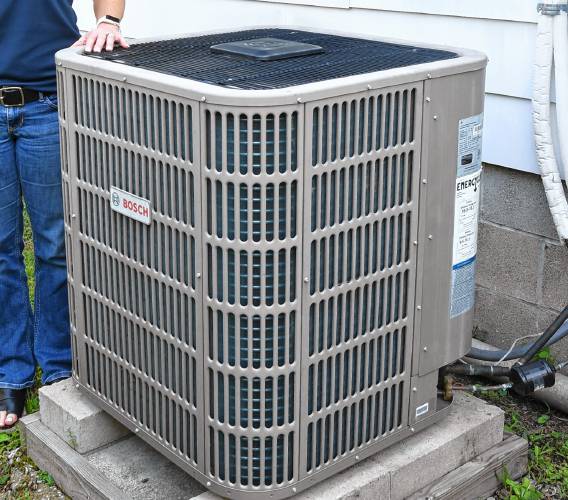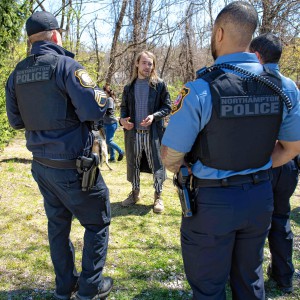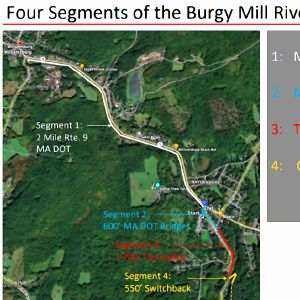MassDEP’s Clean Heat Standard poised to advance energy shift

A Bosch air-source heat pump. STAFF FILE PHOTO/PAUL FRANZ
| Published: 02-27-2024 4:00 PM |
While many communities have made progress in reducing greenhouse gas emissions, many experts believe the next big step statewide will involve electrifying home heating systems, a process the Massachusetts Department of Environmental Protection is embarking on with a potential registration program for companies that supply fuels.
The Clean Heat Standard is a proposed regulatory program that would require heating energy suppliers to reduce their greenhouse gas emissions over time. Regulated companies that supply heating oil, propane, natural gas and electricity would demonstrate emission reductions by holding clean heat credits. MassDEP is expected to roll out the program by 2026.
The voluntary registration program will help process credits faster once the program goes into effect. Once finalized, residents who already installed heat pumps or other qualifying projects within a certain period would be able to retroactively apply for credits.
“We don’t want to send a signal to people that they should wait to do something until the program becomes in place and we’re struggling to deal with that,” William Space, an environmental analyst with MassDEP, said during a recent meeting on the Clean Heat Standard.
Clean heat credits are electronic records that demonstrate a supplier’s compliance with the clean heat standard. According to MassDEP, these credits can then be bought and sold for monetary value to offset a supplier’s emissions and prices would be set by each party. Each year, heating energy suppliers would need to show that they have earned or acquired enough clean heat credits to meet their annual responsibilities to reduce greenhouse gas emissions.
“Clean Heat Standard is a concept that’s been under discussion in Massachusetts for quite some time now,” Space noted. “MassDEP was tasked to develop a Clean Heat Standard that’s practical, cost effective and equitable in its implementation.”
According to the presentation at the meeting, homeowners would have to first install a clean heating system — like an air-source or ground-source heat pump — that serves as the primary heating system. They must also remove all or limit the use of combustion space heating equipment.
The homeowner would then have to submit a qualifying application through the Clean Heat and Emissions Tracking System — an online platform designed to track credit generation. Once the application is submitted and accepted, full electrification clean heat credits would be allocated to the owner.
Article continues after...
Yesterday's Most Read Articles
 Police report details grisly crime scene in Greenfield
Police report details grisly crime scene in Greenfield
 Super defers Amherst middle school principal pick to successor; one finalist says decision is retaliation for lawsuit
Super defers Amherst middle school principal pick to successor; one finalist says decision is retaliation for lawsuit
 Homeless camp in Northampton ordered to disperse
Homeless camp in Northampton ordered to disperse
 Authorities ID victim in Greenfield slaying
Authorities ID victim in Greenfield slaying
 Haydenville residents resist Greenway trail plan, float alternative design
Haydenville residents resist Greenway trail plan, float alternative design
 Locking up carbon for good: Easthampton inventor’s CO2 removal system turns biomass into biochar
Locking up carbon for good: Easthampton inventor’s CO2 removal system turns biomass into biochar
The Clean Heat Standard is a part of the broader Clean Energy and Climate Plan for 2025 and 2030, which provides additional aggressive measures the state will take to reduce carbon emissions. According to this plan, the state aims to install 2.8 million heat pumps by 2050. Heat pumps are a more efficient way to heat or cool a home because they use electricity rather than burning fossil fuel.
While increasing electric vehicle charging stations and expanding public transportation are standard ways communities can reduce greenhouse gas emissions, electrifying heating systems is one of the best methods for rural areas of Massachusetts.
“Our small and rural communities that comprise a lot of western Massachusetts have unique needs,” state Rep. Aaron Saunders, D-Ludlow, said in an interview. “We have a really exciting future in decarbonizing our electrical grid and electrifying our home heating.”
Saunders added that although electrifying heat is a step in the right direction, it also requires rural communities to have reliable electrical grids that continue to operate during heavy storms.
“This is a different type of consideration for western Mass,” Saunders said. “We also have to have a distribution grid that is reliable because if the power goes out, and you rely on electricity to heat your home, you can’t leave folks out in the cold in good conscience.”
There are many challenges when it comes to rural towns divesting from fossil fuels, like repairing older buildings and prioritizing climate projects in the wake of tight budgets.
“When you’re dealing with older buildings, like a city hall that’s been around since the 1800s, to retrofit the buildings is quite an undertaking,” he said. “It takes financial resources that, depending on the budget year, aren’t always the most readily available.”
Saunders added that educating people in rural communities about the importance of lowering their emissions and tailoring policy to meet the needs of these communities is very important.
“When we in the western part of the state have the flexibility to move forward and progress toward these goals in a way that works for our community,” Saunders said, “that’s how we’re going to get the best outcome for our residents, for our environment and for our climate.”
Tanisha Bhat writes for the Gazette from the Boston University Statehouse Program.

 Federal probe targets UMass response to anti-Arab incidents
Federal probe targets UMass response to anti-Arab incidents William Strickland, a longtime civil rights activist, scholar and friend of Malcolm X, has died
William Strickland, a longtime civil rights activist, scholar and friend of Malcolm X, has died
